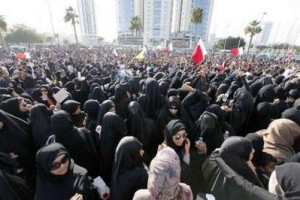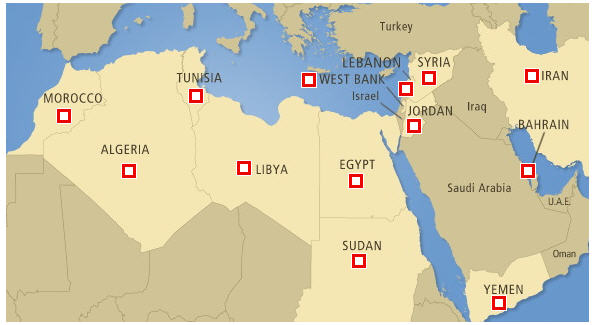Arab leaders across the Middle East, including North Africa, are scrambling to prevent the revolutionary contagion that toppled President Ben Ali of Tunisia and President Hosni Mubarak of Egypt from infecting their country.
Their actions range from the king of Bahrain pleading for calm while warning of an imminent Tiananmen Square-style crackdown to the president of Yemen aping the king of Jordan by throwing government officials under the bus and the emir of Kuwait giving every citizen $3,572 and promising free food for all for one year.
But nothing demonstrates how truly desperate and clueless these leaders are quite like President Khadafi of Libya trying to deflect protests by exhorting the Libyans he has oppressed during his 41-year dictatorship to help the Palestinians fight for liberation from Israel and calling for a Pan-Arab jihad against white people:
Fleets of boats should take Palestinians … and wait by the Palestinian shores until the problem is resolved…This is a time of popular revolutions. The white colour has decided to get rid of the green colour. These countries should be united against the white colour because all of these white countries are the enemies of Islam… All Arab states which have relations with Israel are cowardly regimes
(Al Arabiya, February 13, 2011)
 But protesters have broken the psychological barrier of fear that once made demanding democratic freedoms seem like a death wish.
But protesters have broken the psychological barrier of fear that once made demanding democratic freedoms seem like a death wish.
In fact, they appear to be inspired by the Patrick Henry-like words of Wael Ghonim, the Google employee who became the de facto youth leader of the Egyptian revolution:
The regime was extremely stupid. They are the ones who basically ended themselves. They kept oppressing and oppressing and oppressing and oppressing… We’re gonna win because we have a dream. We’re gonna win because we’re convinced that if anyone stands up in front of our dream, we’re ready to die defending it.
(60 Minutes, February 13, 2011)
With all of these protests, leaders in Yemen, Algeria, Jordan, Syria, Bahrain, Kuwait, Iraq, and Iran must all be fretting about suffering the same fate as Ben Ali and Mubarak.
After all, if this revolutionary contagion could bring down Mubarak, leader of the biggest and most powerful country in the Arab world, clearly no leader is safe. Unfortunately, like Mubarak, many of them might find that no amount of political and economic reform at this point will stop emboldened protesters from demanding their heads too.
Meanwhile, the United States is doing its best to fan the flames of these democratic protests without burning bridges that are critical to furthering its foreign policy interests. And nowhere is this balancing act more delicate than in Bahrain, home to the mighty U.S. Fifth Fleet and where ground was broken just last year on a $580 million expansion to double the size of its naval base.
Not to mention that supporting the democratic protesters in this case is complicated by the fact that the vast majority of them (in fact 70 percent of all Bahrainis) are Shiites who are trying to depose a Sunni despot whose family has ruled the country for over 200 years. Which means that a new government there is far more likely to be inspired by the Iranian Ayatollah Khomeini than the American Thomas Jefferson.
But hey, democratic elections do not always produce the government we want. Just look at George W. Bush in 2000 for example. I would be willing to bet my life savings, however, that Bahrain’s powerful Sunni patron, Saudi Arabia (covertly aided by the U.S.), will never allow a Shiite government to come to power….
Related commentaries:
Mubarak resigns…
